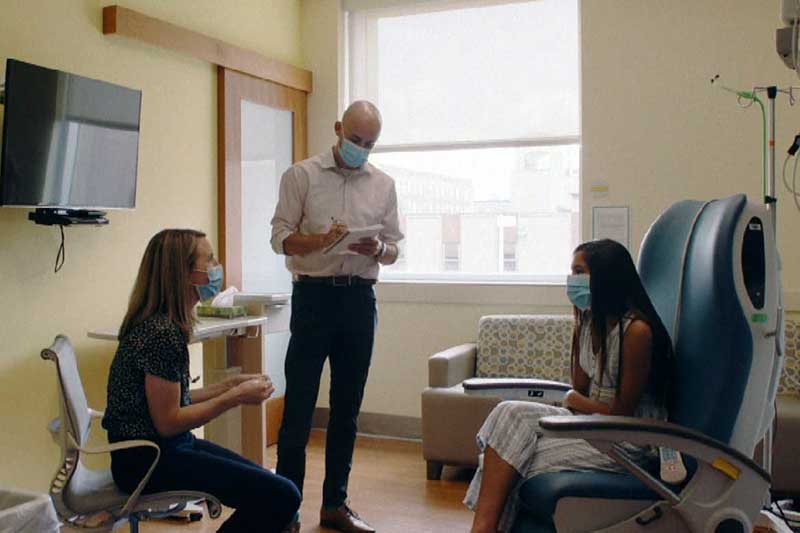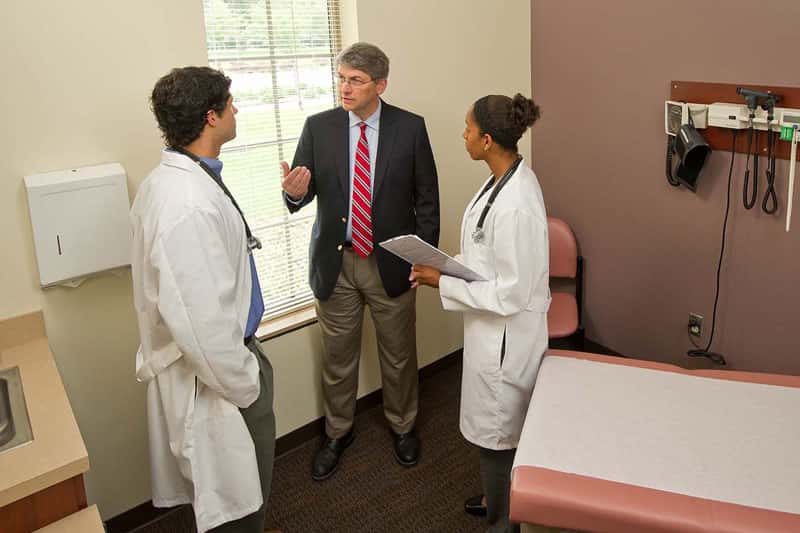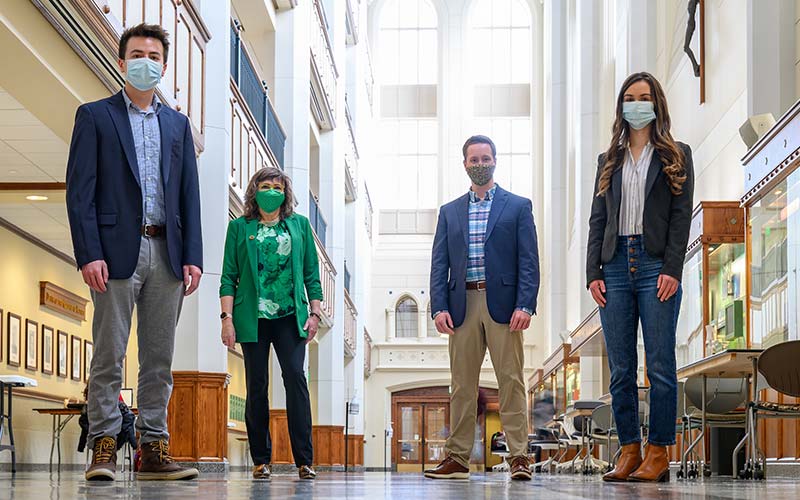
When Dr. Matthew Molloy ’10 was a student at the University of Notre Dame, he knew he had to participate in some form of “job shadowing” where he followed a physician around for a day or more, asking questions and watching the doctor’s interaction with patients.
“I think those shadowing experiences can be so variable,” said Molloy, now a pediatric hospitalist at Cincinnati Children’s Hospital. “Some people can have an awesome shadowing experience, but I almost felt I was doing it a little to check a box.”
Most people who shadow can’t delve into how doctors think, and are exposed to only one type of medicine. Also, if a doctor had a busy day, it can be difficult to ask questions or get advice. In 2020, the practice came to a screeching halt anyway because of the COVID-19 pandemic.
The parameters the pandemic created, however, sparked an idea for Notre Dame seniors Tyler Dann, Leah Gudex and Alex Nisbet. The three friends serve together on the leadership board for the Notre Dame Preprofessional Society, which hosted a speaker series in the fall with physicians through Zoom. After the series was complete, they realized they could do more: create an entire class where Notre Dame alumni physicians can share their experiences with the next generation of allied health workers.
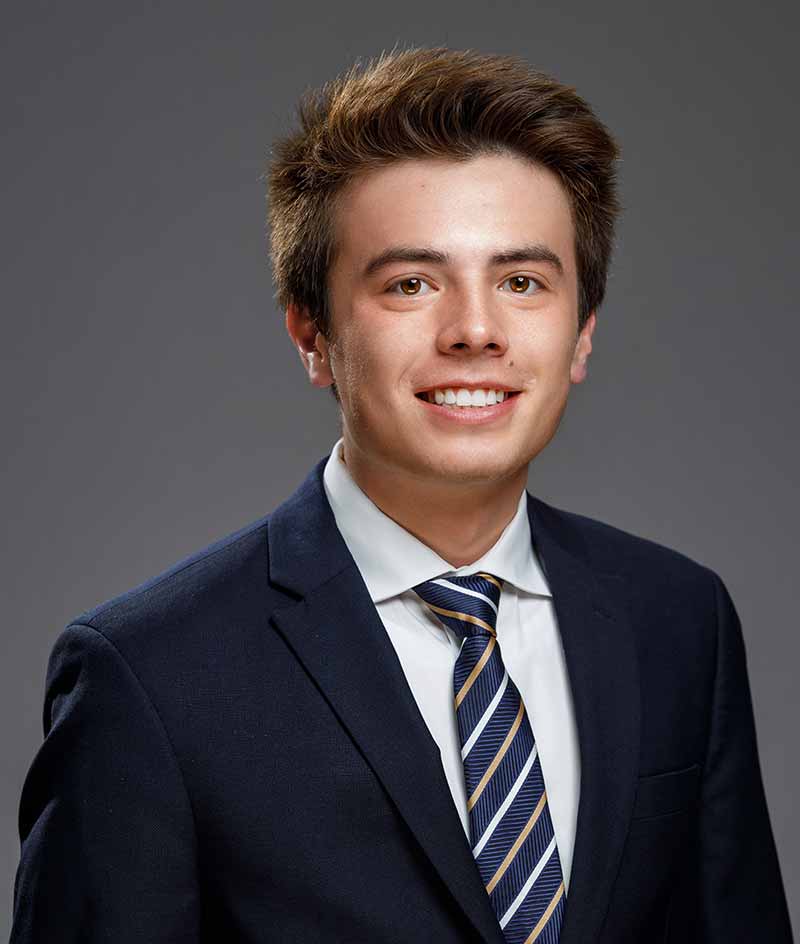
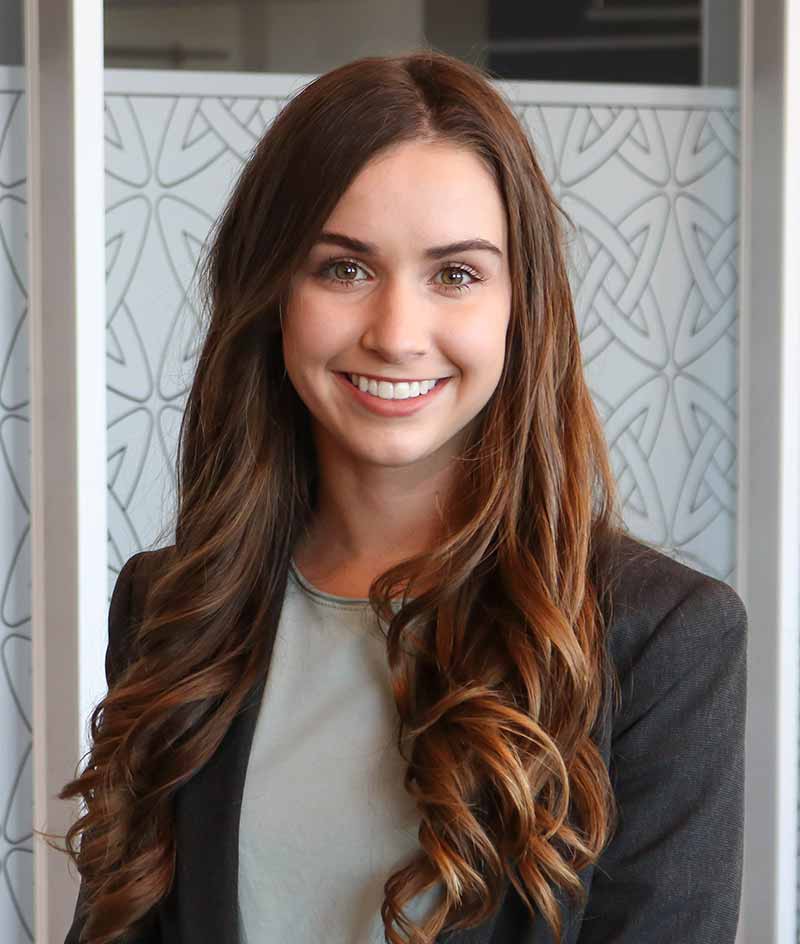
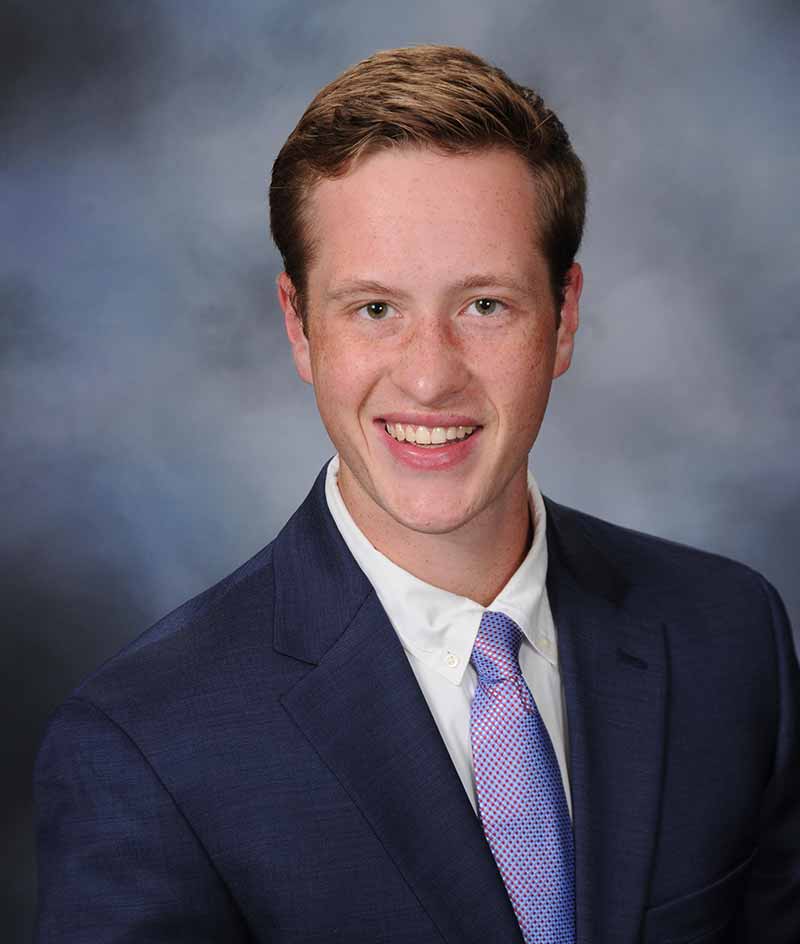
Dann, Gudex and Nisbet approached Kathleen Kolberg, assistant dean of undergraduate studies and adviser in preprofessional studies, to find out if they could create a 1-credit-hour course — almost like a virtual “job shadowing” experience accompanied by upper-level biological and medical physics readings — to be held during the extended winter break.
“She said it was a fantastic idea, and starting in mid-November, we helped her write a course proposal and syllabus, and applied for the winter term class,” Dann said. He started reaching out to different physicians through Irish Compass, the University’s network of professionals, to see who might be willing to donate their time for the class sessions.
In all, nine physicians met with the class, called Biomedical Case Studies in Medicine, held Jan. 4-26 on three evenings a week during the winter session. Thirty-nine students took part.
Dann, Gudex and Nisbet served as teaching assistants for the class, which was part case-based with presentations by the doctors, and part discussion.
“It was a lot different than in-person shadowing, but in certain regards we were able to get even more out of it,” Dann said. “Virtual shadowing enabled us to reach significantly more people than we could have with physical shadowing.”
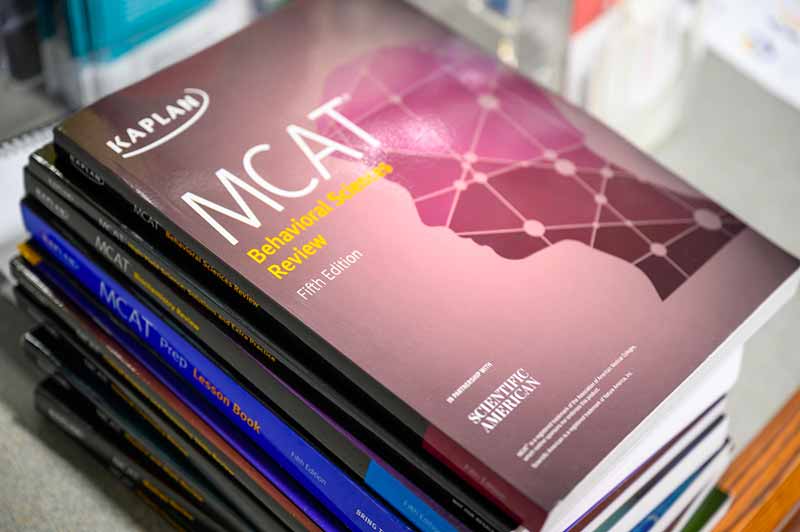
Physicians who participated shared directed reading or video materials before each class, which provided the students with context about the case the physician planned to discuss. After the presentation, the physicians opened up a question-and-answer period.
The students gave the physicians complete control of their own class period. “We didn’t want to make specific demands; the physician is the expert,” Gudex said. “They would send us multiple topics pertinent to their field of study and they would ask what topic we found most interesting, and then they would run with it.”
Dr. Kari Wagner ’06, who works as a neonatologist at Walter Reed National Military Medical Center in Bethesda, Maryland, also teaches as part of her job and finds it fulfilling. For her, preparing a discussion about neonatal jaundice for the class at Notre Dame was another way to spark intellectual curiosity.
“I really enjoyed it, and it’s fulfilling to teach things to students to get them excited about the material and more engaged,” she said. “This was a good supplement to in-person shadowing, and has the potential to expose the students to a wider range of medicine and specialties, because with most shadowing, you only get to see one specialty.”
Dr. Tim Kegelman ’07, a radiation oncologist at the University of Pennsylvania, agreed. He shared with the students the process of going through a lung cancer diagnosis and spotlighted “a specialty they might not have gotten exposure to before. … It’s small and niche, but an important part of cancer treatment,” he said.
One of the biggest benefits to students, Kolberg said, was the opportunity to hear how doctors and other allied health professionals work together as a team — something she has shared with students in her role as an adviser. Dr. Aaron Quarles ’10 works in the emergency department at Northwestern Memorial Hospital, and gave a little information about his background before sharing more about the importance of teamwork.
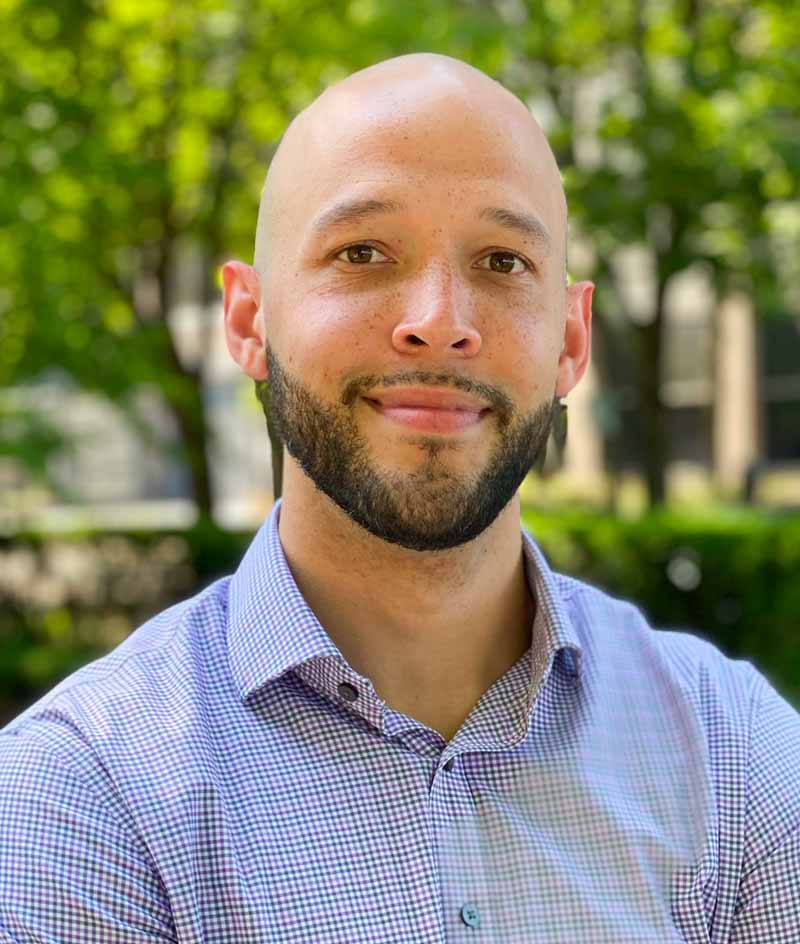
“Getting a big, loud group of 10 to 15 people in the same room all moving towards one goal — someone has to stand up there and direct, and that’s my role,” he said. “I’m trying to buy the patient time, and everything I do is aimed at buying time. This showed students a different way of being a doctor.”
He described how actually being a doctor is vastly different than how people think about being a doctor. People think about prestige, or money, or intelligence, he said, but Quarles noted that doctors are still limited in knowledge and must work with their teams and patients to solve problems.
He also shared the frustrations of not being able to help patients as much as they would like. For instance, if someone is having a mental health crisis and he cannot find a facility for them immediately, they are “stuck” in the emergency room without privacy, so it is not helping the patient with his or her crisis.
Carlondrea “Lala” Petty ’23 had wanted to take a winter session course. Though she would like to work as a sports physical therapist in a Spanish-speaking country, she is also interested in potentially working as an obstetrician/gynecologist or an emergency room doctor. Therefore, Petty was excited to hear from doctors in different specialties.
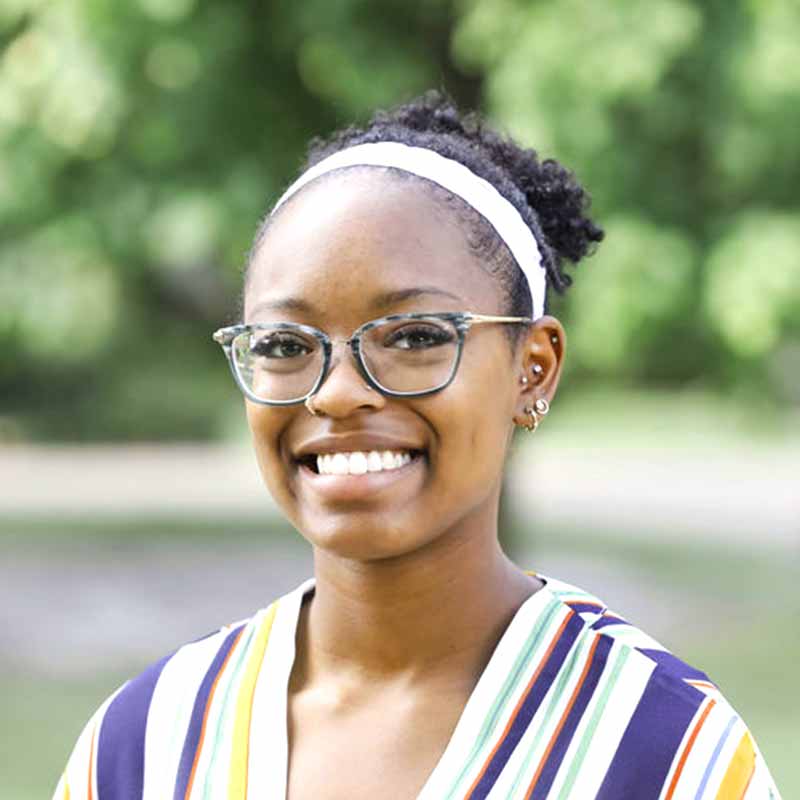
“How even at his job, he brings to work the feeling that if he stands for something, he stands for something, and during this time it is so important.” —Carlondrea “Lala” Petty ’23
One of her most surprising takeaways: She felt like she connected with several of the physicians who spoke, especially with Quarles. He started the Black Student Association at Notre Dame when he was a student, and she is a current board member.
“I didn’t expect to feel validation from the course in that I am a Black woman, and it was really important to hear from Quarles, and his journey as a Black man,” she said. “How even at his job, he brings to work the feeling that if he stands for something, he stands for something, and during this time it is so important.”
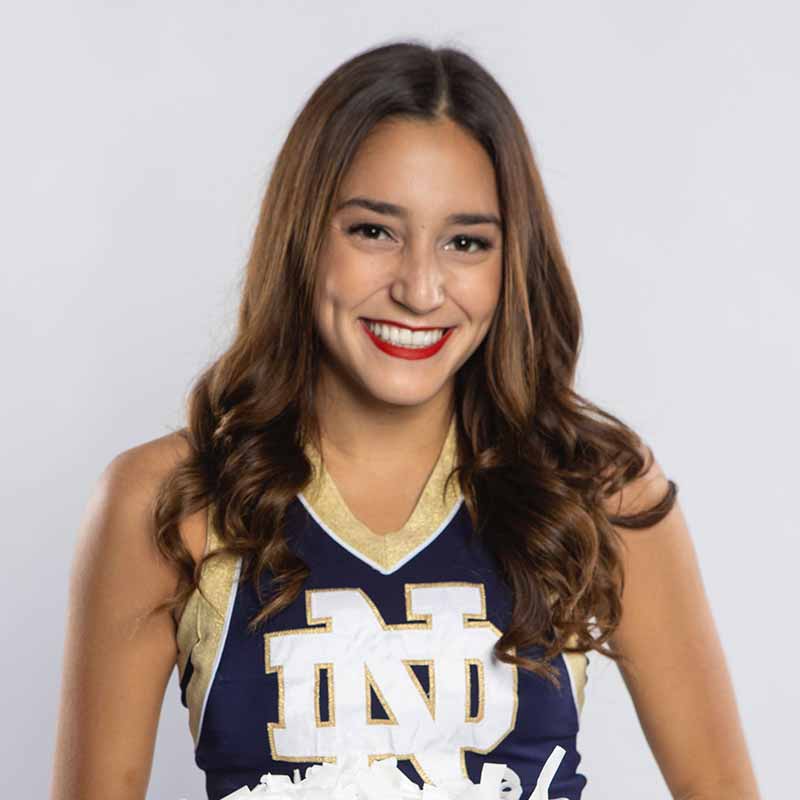
“Even doctors in Venezuela who migrate here have talked about how it is difficult to shadow, so I am so grateful that Leah and the other TAs made this happen.” —Valentina Espinoza ’22
Standing for something is important to Valentina Espinoza ’22, who had been deciding whether to become a physician or go into public health and public policy. After hearing about the different specialties and the lifestyle of being a doctor, she realized the pull for her was more toward public policy, where she can effect change.
For those who want to be doctors, however, the opportunity to virtually “shadow” during the class was helpful to students who don’t have connections to physicians, she said.
“COVID was legitimately a blessing in disguise for a lot of first-gen students (those whose parents didn’t attend college),” said Espinoza, who is from Venezuela. “Even doctors in Venezuela who migrate here have talked about how it is difficult to shadow, so I am so grateful that Leah and the other TAs made this happen.”
Lena Do ’21 appreciated the discussion several physicians had about not only the process of becoming a doctor, but the evolution of their careers on a personal level. One physician discussed what it meant to be a doctor — and it wasn’t what would come to mind for most people: Doctors are people who make mistakes. And they can’t end all suffering, even if they would like to.
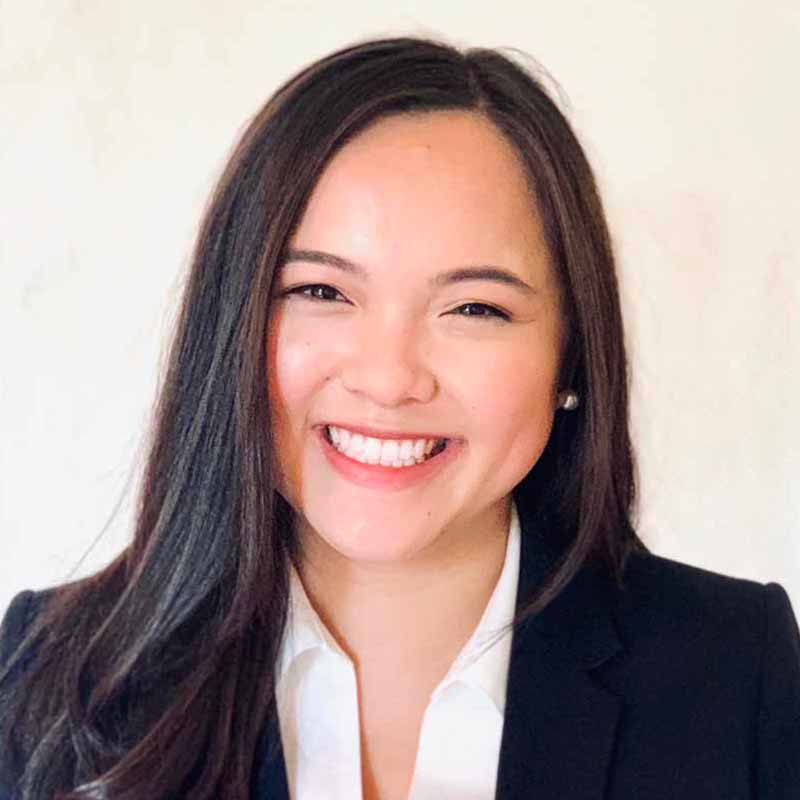
“I began to understand there is no final resolution or pinnacle of your career. It’s an ongoing profession with potential for growth from when I enter medical school through my retirement.” —Lena Do ’21
“I began to understand there is no final resolution or pinnacle of your career,” Do said. “It’s an ongoing profession with potential for growth from when I enter medical school through my retirement.”
The widespread use of online learning because of the coronavirus became a blessing, said Dr. Rev. James Foster, C.S.C., associate dean and director of the Center for Health Sciences Advising. Even though many would like to get back to face-to-face interactions, the online nature of the course allowed alumni from across the nation to connect with students in a way they would not have been able to do before.
Father Foster appreciated the Irish Compass mentoring database and praised the physicians for their generosity in working with the students in the class as well.
“There is a downside that this isn’t quite like shadowing, where you get the smell and feel of the place and get to observe the collaborative nature of the team, including the connection with patients — but this is valuable and not an opportunity we were using before,” Father Foster said.
“I spent a lot of the time smiling,” Kolberg said about her time assisting the students with the development of the course, and then as she watched the doctors give their presentations. “I’m thankful for the alumni, because they were so generous with their time.”
Students and the physicians who participated in the course all agreed that the class should continue in some format even after the threat from COVID has passed.
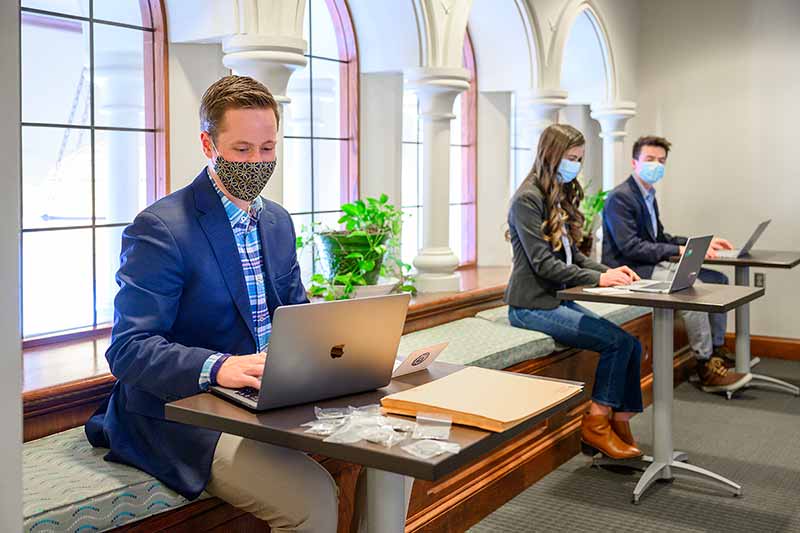
Petty said she would recommend the course to other students who are considering any health field “because the health care system is filled with many people who are all connected, and it’s important for everyone and very helpful to learn how the system works.”
Quarles said he wishes he had had this type of opportunity when he was a student.
“In addition to the fact not every student has an opportunity to shadow, it would have been nice to have been in a room to talk to several young doctors,” he said. “Because as a college junior, you’re looking at 10 more years of schooling and training, and it’s good to talk to someone who is fresh off their experiences in medical school to describe what the process is like.”
Molloy, the pediatric hospitalist, praised Kolberg and the students who developed the course, adding that it’s another tool Notre Dame can use to help students get into medical school.
“Even though Notre Dame doesn’t have a medical school, this is a great example of how the students and advisers were really thoughtful about how to get students the experiences they will need and help them with their decision-making process before applying to medical school,” he said. “Notre Dame has a good track record of getting students admitted into medical school, and programs like this are a testament to how good of a program they have.”

